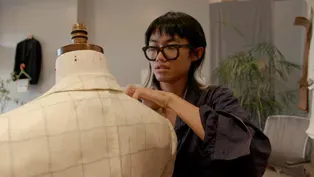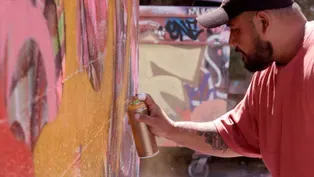
A Night to Remember: Dr. Joseph Chazan
Clip: Season 3 Episode 6 | 9m 7sVideo has Closed Captions
Remembering the arts patron, Dr. Joe Chazan: an opening night turns into an epic reunion.
Recently, opening night of an arts exhibition transformed into an epic reunion of Rhode Island creatives and their no-nonsense benefactor, Dr. Joseph Chazan. Just days later, Rhode Island lost this great arts champion. Dr. Joe didn't just collect art; he collected friends as he decorated the state. We're looking back and celebrating Chazan's life and legacy, on Art Inc.
Problems with Closed Captions? Closed Captioning Feedback
Problems with Closed Captions? Closed Captioning Feedback
Art Inc. is a local public television program presented by Rhode Island PBS

A Night to Remember: Dr. Joseph Chazan
Clip: Season 3 Episode 6 | 9m 7sVideo has Closed Captions
Recently, opening night of an arts exhibition transformed into an epic reunion of Rhode Island creatives and their no-nonsense benefactor, Dr. Joseph Chazan. Just days later, Rhode Island lost this great arts champion. Dr. Joe didn't just collect art; he collected friends as he decorated the state. We're looking back and celebrating Chazan's life and legacy, on Art Inc.
Problems with Closed Captions? Closed Captioning Feedback
How to Watch Art Inc.
Art Inc. is available to stream on pbs.org and the free PBS App, available on iPhone, Apple TV, Android TV, Android smartphones, Amazon Fire TV, Amazon Fire Tablet, Roku, Samsung Smart TV, and Vizio.
Providing Support for PBS.org
Learn Moreabout PBS online sponsorshipkeepsomething else up here.
- [Richard] Of something happening.
- [Interviewer] Ready to go.
So you're shooting now?
We're on camera?
- Yep.
- Very good, Richard.
Okay, we're here in AS220.
No, we're not, with TV220.
Joe, if you can just tell us a little bit of, you're a doctor, but there's a lot of kinds of doctors.
- Yeah.
- What kinda doctor are you?
- Well, I'm an internist and I'm a nephrologist.
Nephron means kidney.
I take care of people with kidney disease.
(scene rattling) - [Interviewer] The reason why we're here is to talk about you not only as a doctor, but as an art patron, and collector, and friend of the arts.
And we've walked through your- (scene rattling) - And I've been smart enough to pick the good artists so people think I have a good eye, but I just found nice people who happen to be good artists.
(scene clicking) (relaxing jazzy music) (relaxing jazzy music continues) (crowd chattering indistinctly) There we go!
- Big bang.
- If anybody could ever have created a perfect situation, which at the end of their life, they could have had what he had.
All the people that he cared for, family, friends, artists, institution, and who cared about him expressing their genuine affection for Dr. Chazan.
- Oh, it was magical.
It was a magical evening.
It was like a reunion and such a celebration.
He was just over the moon about, you know, how great it was.
- So the show really speaks to the profound impact the arts have on all of Rhode Island: its thoroughbred, its economy, its very essence.
- The acknowledgement, the respect, the love, all of it, it was all focused on him the night of the opening.
A week later, quietly, he goes, he's no longer with us.
(crowd chattering indistinctly) (upbeat music) (upbeat music continues) - Primarily, this was an opportunity to look at a particular project that Dr. Chazan did with AS220, which was called NetWorks Rhode Island.
- And basically, it was a series of video portraits of Rhode Island contemporary artists.
- It's the second year that we're producing this concept, which started about a year ago when Bert Crenca and I conceived of the notion of documenting Rhode Island artists.
- By the time I met him, he had already had begun to create a legacy of collecting and supporting artists.
And some of those artists, in the early days in particular, were like the Howard Ben Tres, and Chihuly, and people like that who are in museums all over the world and stuff.
(pensive flute music) But it was also very helpful in my own personal development and the recognition that I've received for my work, so.
And that was his way.
I mean, he just, you know.
Joe said, "I don't know anything about art, but I kinda know people."
And he kinda, I don't know if he would've said it this crassly, but he collected people.
- There aren't that many individuals who collect artists who really are there to support the careers and the dreams and opportunities for artists beyond just owning their work.
- He was smitten with the idea, he was smitten with the museum, but most importantly, he was smitten by the artists.
- So that was a video that I made for WaterFire.
They were presenting a tribute at their annual fundraiser to Joe Chazan.
You know, he was this sort of larger-than-life guy when I first met him the mid '90s probably.
He was really simple about it, you know.
He felt that art was one of the really good- - [Joseph] Things that human beings do.
And it enhances and improves our existence.
- [Richard] And he realized he had the wherewithal to do that, being a very successful physician.
- He did his residency in Alabama during the segregation years.
He heard the Birmingham church bombing happened live from his backyard and how that was a huge, you know, moment in his life, where it just affected him and it made him realize that appreciation for the beautiful things in this world, building community, supporting art practice was essential.
(nostalgic music) - So for me, it's people who maybe I'm helping behind the scenes to allow them to live in a community that fosters support of them.
Since I have been around and children living in Rhode Island, grandchildren, I'd like to see the community succeed also.
(nostalgic music continues) Many of you said that he positively impacted your career or gave you an opportunity to try something new, that you could always count on his support, that he was honest, direct, and kind.
Most meaningful to me was how many of you said that he invited you into his home and his life, that you shared wonderful dinners together, that he was interested in you and your families, that he was your friend, and that you missed him.
(nostalgic music continues) - One of the things that always vexed him was like, "Why don't more people do what I do?"
- There's such a void and such a need for arts patronage in Rhode Island.
- We live in a community that has exceptional artists, and we don't have an exceptional collector base.
- I mean, there's other players, but Dr. Chazan was a really big player.
He decorated the city.
(lighthearted jazzy music) - He had incredible impact across the whole State of Rhode Island.
- And if we could bottle that and pour people shots, you know, who have means... - He could have put his name on a building.
Instead, he chose the artist and the nonprofits.
We had no value for the community, for the politicians.
And now, we have identity, we have respect.
We have respect!
And people acknowledge that being an artist is something good for the community.
- The work of the artist about people, and the work as a physician is the same.
And you do it because you do it.
That's what you're supposed to do.
And you're supposed to follow the goal of accomplishment without necessarily looking for reward or recognition.
I'm very pleased with the show.
Have a good time and buy some art.
(crowd cheering)
Video has Closed Captions
Bao Vu, of k-zao studio, creates a custom suit for a transitioning client. (5m 58s)
In The Studio, In The City: Savonnara Alexander Sok
Video has Closed Captions
Savonnara Alexander Sok creates art centered around community and connectivity. (9m 24s)
Providing Support for PBS.org
Learn Moreabout PBS online sponsorshipArt Inc. is a local public television program presented by Rhode Island PBS













